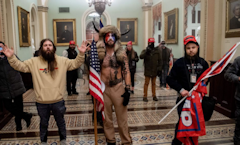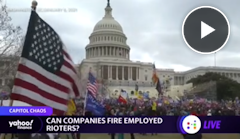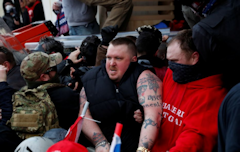DC Rioters Getting Fired
- Gotta Love All the Cameras in DC



Here are the rights employers have to fire workers identified as Capitol Hill
rioters
Trump supporters
who were fired from their jobs for participating in Wednesday’s siege on the
U.S. Capitol may be asking themselves if their termination was legal.
Dozens of Trump supporters were arrested after storming the Capitol to protest
the election results, and
Reuters reported Thursday that “internet detectives” identified some
participants who were later fired by their employers. Even for those fired
Trump supporters who did nothing illegal, it may still be perfectly legal for
their employees to fire them — at least under federal law.
Under federal law, aside from workplace complaints, there are few limits on a
private employer’s right to terminate a worker over forms of speech, such as
participating in a protest,
Amanda Sonneborn, a partner at King & Spalding and part of the firm’s global
human capital and compliance practice, told Yahoo Finance.
However, some states and local
jurisdictions, Sonneborn said, do offer employees protection from being fired
over their lawful, off-duty activities, including political activities.
&uuid=(email))
“It totally varies state by state,”
Sonneborn said. “Most famously, California has an expressed protection of
employees’ right to speak on political issues, and limitations on an
employer's ability to take action for employees’ off-duty conduct or off-duty
political speech.” Cities including New York, San Francisco, and Chicago have
adopted their own laws against firing workers over political activities.
Government employees, on the other hand, are entitled to broader safeguards
under the First Amendment, which protects free speech and the right to assemble.
“To the extent to which demonstrating the mall in Washington DC would be
constitutionally protected, a state actor or government employer couldn't take
any adverse action against an employee for doing that,”
Cozen O’Connor labor and
employment attorney
David
Barron told Yahoo Finance.
‘You can always be fired for engaging
in criminal activity’
Regardless of whether somebody works for the private or public sector, employees
can always get fired for breaking the law. “The real issue there is going to be,
was [the activity] just a political expression that might be protected under
some state law, or was it a crime?” Barron said. “You can always be fired for
engaging in criminal activity.”
&uuid=(email))
Demonstrators who illegally trespassed into the Capitol, for instance, could
be easily terminated, especially if it was caught on video.
“You're on much safer ground, because what you’re terminating the employee for
is, in your perception, violating the law...not the fact that it was for Trump,”
Sonneborn said. “It didn't matter that they were there for Trump, or for Black
Lives Matter, or Joe Biden. It’s that you broke the window of the Capitol.”
Social media statements posted by the Trump supporters that merely express a
political viewpoint or reveal they protested outside the Capitol could be more
difficult to use as a basis for termination, depending on the state and location
where the employee works, according to Sonneborn.
“If someone was just standing there with a flag and all they admitted to, and
all you had proof of was that they were lawfully protesting, using our clearest
example of California, [a private employer] will have a hard time terminating
that person,” Sonneborn said.
Absent state or local laws that prevent workers from being fired over political
actions, a private employer could terminate Trump supporters regardless of
whether they broke the law. In U.S. labor law, employers can fire workers
for any non-discriminatory reason as part of a concept known as at-will
employment. (Employers can’t discriminate against employees based on various
protected classes, such as race, religion, and disability.)
That means private employees who live in states that don’t specifically protect
their right not to be fired for political activity could be out of luck. “So if
they don't like your political views and the state doesn't protect your right
to express them, they can terminate you for them,” Sonneborn said.
Still, Barron describes “at will” as the default rule.
“And then there's a laundry list of exceptions, he said. “And then each state
has their own unique set of exceptions... it’s sort of a common
misperception that [at will] is sort of the be-all-end-all because it's just
really a starting place.”
yahoo.com
reuters.com